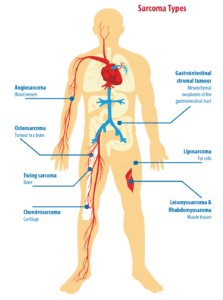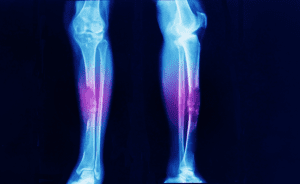
Posted 4 years ago
Hereditary Sarcomas
A sarcoma is a rare type of cancer that develops in connective tissue. Sarcomas can develop in a variety of tissues such as bone, soft tissues, fat, muscle, nerves, fibrous tissues, blood vessels and deep skin tissues. They most often develop in the limbs, but can be found in any part of the body. A common question for individuals who are diagnosed with a sarcoma is what caused it to develop?

These genetic conditions are all caused by changes (mutations) in our genes that are usually passed along through the generations of a family. Individuals with a genetic mutation in a disease-causing gene will have an increased risk of sarcoma and possibly other cancers compared to the average person, but not everyone with such a mutation will actually develop cancer.
Further, the same mutation may manifest with different symptoms, even among family members. Because we cannot predict which cancers may develop, additional medical management strategies focused on cancer prevention and early detection may be beneficial.
Identification of a disease-causing genetic mutation would also help guide testing and diagnosis of at-risk relatives. Genetic counselors broadly recommend hereditary genetic testing for any individual with a current or past history of sarcoma.
As a certified oncology genetic counselor, Mandy works with patients who have a personal and/or family history of cancer to assess their risk of having an inherited cancer predisposition. This information allows for the pursuit of early detection or possibly prevention of certain cancer types. The ultimate goal of cancer genetic counseling is to empower patients to use their personal risk information to better inform treatment and management decisions and to educate family members on their possible cancer risks.
About Ironwood Cancer & Research Centers
Ironwood Cancer & Research Centers (ICRC) is the largest multi-specialty oncology network in the Greater Metro Phoenix area. They have over 100 medical providers, a robust Integrative Services program and a dedicated clinical research department. Ironwood Cancer & Research Centers has 15 valley locations and five comprehensive cancer care centers that offer a multi-disciplinary approach for expedited personalized patient care. For more information, please visit www.ironwoodcrc.com.


 About Mandy Kass, MS, CGC
About Mandy Kass, MS, CGC